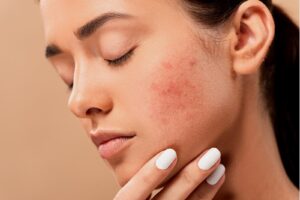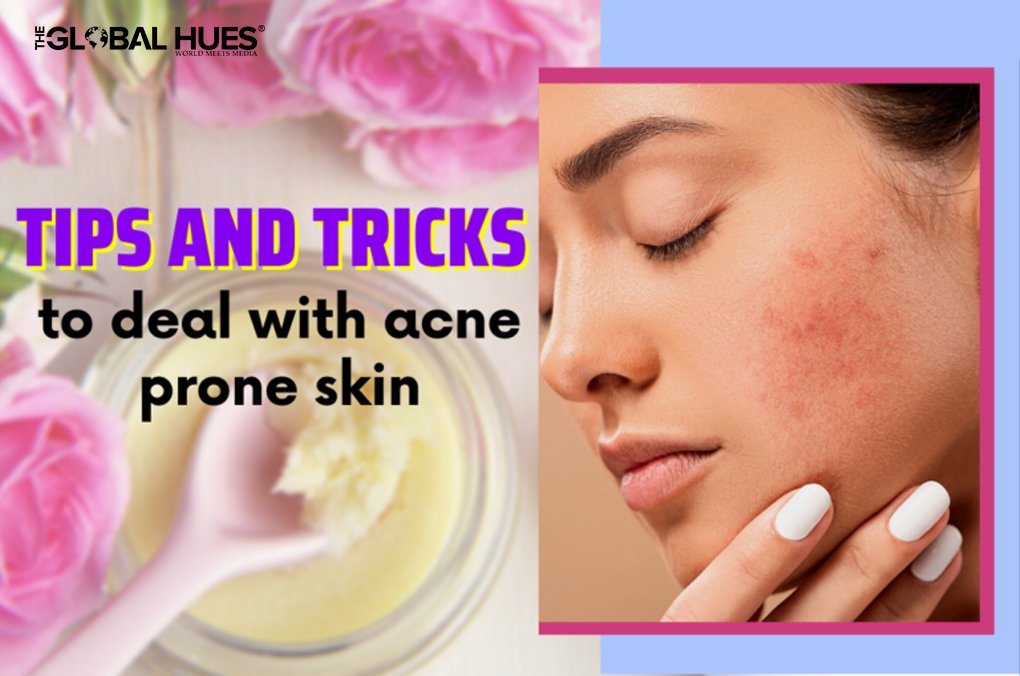We all can agree that the teenage years are not easy, but dealing with acne should be the least of your worries because we got you covered. Though, teenagers eagerly wait to hit puberty as that’s the time when they most likely to “glow up” yet these years can be hard, and self-doubting for the ones who encounter acne quite frequently.
Acne is not just reserved for teens, adults can get acne too especially when they are stressed or going through hormonal changes in their bodies. Despite it being the most common skin condition among people it is not something one can ignore as it can be painful, inflammatory, and even lead to scarring. Identifying the type of acne, you’re experiencing can help avoid such situations and act as a key to better treatment.

But before discussing how to treat acne let’s dive deeper into what causes acne.
CAUSES OF ACNE
Acne is essentially a normal physiologic occurrence in the body majorly caused by hormonal fluctuations. During puberty, both boys and girls produce high levels of male sex hormones including testosterone that signals the body to make more sebum/oil. When the pores present on the skin are clogged by excess oil, bacteria, dead skin cells, or dirt it might lead to a pimple or “zit”. If this is recurring then you might have acne.
While teenage acne is most often caused by excess oil and clogged pores, adult acne is typically caused by hormonal fluctuations, a blockage of oil, bacteria, stress, or pollution-driven flare-ups. Other factors that might act as a catalyst in this process include:
- Poor Hygiene
Not cleansing your face properly allows the dirt and bacteria to settle in the clogged pores and cause acne. Dirty makeup tools, mattresses, or mobile phones touching your face can also transfer bacteria to your skin and cause acne. - Use of Oral contraceptives
Depending on the type of pills, they can either trigger or soothe acne. Steroids can also lead to severe breakouts. - Not using suitable makeup products
Identifying your skin type and using the right products is very important as products are formulated keeping the requirements of your skin in need and using the wrong product might worsen the situation instead of improving it.
HOW TO TREAT ACNE?
Just like your personality your skin is also unique and needs to be treated with care. Products and treatments do not work similarly to everyone’s skin. While some treatments might be effective others might not work at all. Finding a product that works for your skin is a difficult task but at the same time, you should keep in mind that using too many acne products at once is not a wise choice as it can dry out your skin and in response, your pores can create more sebum, then leading to more acne issues.
However, there are some tips you can use to find the right way to treat your acne.
PATIENCE IS THE KEY!
The first and foremost step is to resist the urge to pop the pimple or pick at your skin. Not only can you make matters worse, but you can also end up with a scar even if the pimple has made its exit.
1. Retinoids and Benzoyl peroxide-
These drugs have been proven to be effective in treating acne-related problems. Benzoyl peroxide available both in the form of over-the-counter products and by prescription targets the acne-causing bacteria. Retinoids have recently gained popularity in the skincare community as companies are coming up with over-the-counter alternatives. They are very effective in dealing with all forms of acne whether mild or severe. However, these products, if not used properly, can cause dryness and irritation.
2. Antibiotics-
Antibiotics can be applied topically or taken orally to help control surface bacteria and reduce inflammation in the skin. They are more effective when combined with products like benzoyl peroxide or retinoids. The most common topical antibiotics for acne include clindamycin and erythromycin.
3. Wear an acne sticker-
An acne sticker is like a bandage that can be directly placed over a pimple. These stickers claim to help remove bacteria, sebum, and dirt as most acne stickers contain an acne-fighting agent, such as salicylic acid.
HOW TO PREVENT YOUR SKIN FROM PIMPLES?
1. Cleanse Twice a Day-
The best way to prevent a pimple or zit from popping up is to cleanse your face twice a day with a suitable face cleanser that is not too harsh or drying on the skin.
2. Use a gentle cleanser and exfoliator-
Use a gentle exfoliator to remove the dead skin cells and keep your skin fresh. Make sure to avoid harsh exfoliants like coffee or walnut scrubs for your face.
3. Moisturize Daily-
You need to make sure that you moisturize your skin at regular intervals to avoid the chances of it becoming dry and compensating with extra oil. Antibiotics can be applied to any spot where a pimple is expected to show up as a preventive measure.
4. SPF is Essential-
Always wear your sunscreen to avoid any damage from the sun. Contrary to popular belief, sunscreen doesn’t cause acne. You can choose from a pool of mineral or chemical sunscreen based on your skin type. Use a generous amount and preferably use 30 SPF or higher for proper protection. A non-comedogenic, water-based, or light liquid-based gel or spray-on sunscreen is best for people who tend to get breakouts.
5. Avoid unnecessary contact with your face–
Avoid any unnecessary contact between your hand and face as touching your skin throughout the day can cause flare-ups. And overall be gentle with your skin.
6. Maintain a healthy lifestyle-
Consumption of certain food products like dairy and foods with a high GI-index can aggravate acne. A high amount of sugar consumption, smoking, stress, and lack of sleep can also contribute to your acne problems. For those looking for natural supplements to support skin health, amazon milk thistle can be a beneficial addition to your regimen.
BUSTING MYTHS ABOUT ACNE-PRONE SKIN

Toothpaste can cure acne-MYTH
If you want to treat acne go for a spot treatment and leave the toothpaste for your teeth as it contains harsh ingredients, such as sodium lauryl sulfate that can clog pores and potentially make your acne worse.
Oily skin doesn’t need to be moisturized-MYTH
As much as it feels like that oily skin does not need moisturization, it is a myth. Every skin type needs moisture to keep it healthy and plump. Avoiding this step in your skincare routine can make your skin vulnerable to irritation, which can increase breakouts. If regular moisturizers feel heavy on your skin then you can resort to gel or water-based formula. Always go for oil-free or non-comedogenic products with added fragrance and mineral oils.
Acne is caused just by not washing your face- MYTH
There can be multiple reasons behind the development of acne on your skin, as discussed above. But the hormones controlling the size and activity of the oil-producing gland are a major cause. Under certain circumstances, the gland size increases and produces more oil leading to blockage of pores. Bacteria, known as P. acnes then grows and multiplies resulting in acne.
Getting a tan helps heal acne- MYTH
Lying out in the sun or a tanning booth dries out the skin and makes you more vulnerable to skin cancer and premature aging. While a tan can camouflage a breakout, it does nothing to heal acne. The process of tanning in the sun or a tanning booth can be drying for the skin and can cause premature aging along with increasing the risk of skin cancer. Although it might or might not help in drying your acne or camouflage a breakout but it does have more bad than good.
Adult acne affects women more than men- FACT
Once an adult, women are more sensitive to hormonal changes as compared to men making them more prone to skin conditions like this resulting in the fact that 12-22% of women will suffer from acne as an adult compared to about 3% of men.
Avoid makeup- MYTH
While some products can be harmful to acne-prone skin but there is no need to avoid makeup rather choose the right products for oily, blemish-prone skin, opt for an oil-free foundation or BB cream that provides the coverage you need.
HOW TO COVER ACNE?
Although pimples come in all shapes and sizes, certain makeup techniques can help to minimize their appearance on your face. Piling on loads of products will not only make the pimples more noticeable but can also slow down their healing process. The right full-coverage foundation/concealer along with the proper tools can be the difference between doing a little too much and smooth natural-looking skin.
Before we begin with discussing the techniques always remember to avoid applying makeup on an open breakout. Instead, use the above-mentioned measures to treat the acne, and remember, makeup is off-limits until that blemish has dried up and closed.
Here are a few tips you can follow:
Ice can be used to soothe the irritated skin and help reduce the swelling but we recommend you do not apply it directly on the face rather wrap it in a thick cloth and use it on the pimple. Another alternative to ice can be a cold spoon or an ice pack.
One of the most common features of any type of acne or pimple is their tell-tale redness. Regular concealers alone may not do the trick so a green color corrector can be used to neutralize the appearance of redness. Once the signs of redness have been camouflaged a concealer or foundation closest to your skin shade can be used to cover it.
Use a spot treatment to effectively reduce the visible signs of a pimple.
One thing you need to keep in mind while using any spot treatment is that they can be extremely drying for the skin so it is best to look out for one with hydrating ingredients in it or properly moisturize your skin using a nourishing moisturizer.
Despite trying several types of treatments for your acne if it is too hard to get rid of, make an appointment with a dermatologist as you might need medical help to clear your skin.
Also Read:
- The Benefits And Effectiveness Of Red Light Therapy
- Surprising Psychology Behind Women’s Shopping – Helping Tips For Your Girlfriend
- 10 Ways To Protect Yourself From The Cold Wave
- 10 Most Reliable Organic Brands In India
- Nutrients To Fight PCOS
- PCOS: Managing Work With PCOS, Symptoms, Prevention & Tips
- Mamaearth- Natural Hair & Skin Care Brand : Is It Organic?




